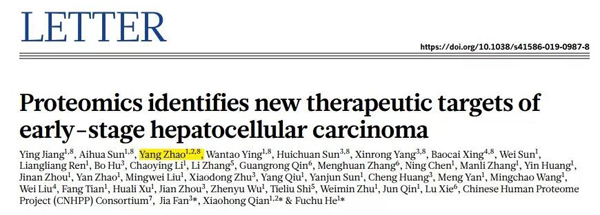On February 28th, Nature magazine published a paper on hepatocellular carcinoma proteomics. The research was undertaken by six different institutes: the Military Medical Research Institute of the Academy of Military Sciences Institute of Life Sciences (the National Center for Protein Sciences), the BJUT School of Life Sciences, the Fudan University Zhongshan hospital, the Peking University Cancer Hospital, the Shanghai Center for Bio-information Technology and the East China Normal University School of Life Sciences. The authors were academician He Fuchu and researcher Qian Xiaohong of the Military Medical Research Institute of the Academy of Military Sciences (Qian is also a part-time doctoral supervisor of the BJUT School of Life Sciences), academician Fan Jia of the Fudan University Zhongshan Hospital and Zhao Yang, a doctoral student at the BJUT School of Life Sciences, who conducted a painstaking five-year study and was the lead researcher and co-first author .The BJUT School of Life Sciences was the second completion unit.

This study was the first to determine the proteome and phosphorylated protein profiles of early hepatocellular carcinoma. Early liver cancer patients were divided into three types based on proteome expression profiles: liver function retention, proliferation subtype and metabolic disorder. Through the integration analysis of multi-omics and the correlation analysis of clinical information, researchers confirmed that the proteome molecular subtype had an extremely high clinical value and biological significance. Through repeated modeling and comparative analysis, researchers found that in the metabolic disorder type proteome data with very poor prognosis, the cholesterol metabolic pathway was reprogrammed, and the high expression of the candidate drug target cholesterol esterase had the worst prognosis. Inhibiting the candidate drug target (cholesterol esterase SOAT1) resulted in a reduction in the cholesterol level on the plasma membrane and effectively inhibited the proliferation and migration of tumor cells. The significance of this research is that it is the world’s first successful example of proteomics-driven precision medicine, positive news for millions of liver cancer patients around the world and something which should help in reducing medical chaos and the financial burden on patients families.






